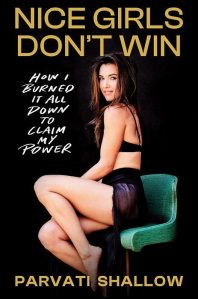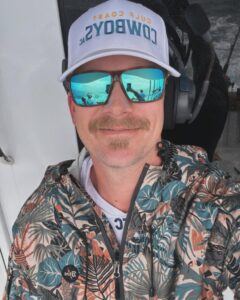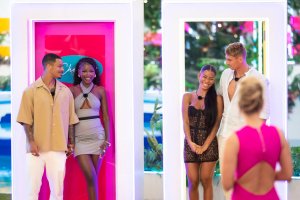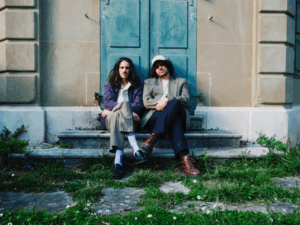Parvati Shallow Compares Her Past Marriage to Childhood Cult in New Book

Parvati Shallow was learning survival skills long before she just stepped on the Cook Islands for her first appearance on Survivor in 2006.
In her new memoir, Nice Girls Don’t Win, Shallow — who would go on to play Survivor four more times (including her upcoming stint on Australian Survivor) and appear on Traitors and Deal or No Deal Island — reveals she spent the first years of her life on a commune led by a controlling guru. Shallow, who interviewed her parents for the book, writes about the guru collecting the members’ money, orchestrating arranged marriages and planning elaborate schemes to adopt her followers’ newborns. The communal living conditions were described as “pure chaos,” where members were punished if they weren’t attentive in endless meditations.
“It was just really interesting to hear my parents’ stories and then overlay them on my adult life because I recreated so much of the same emotional themes that they had gone through without even knowing it,” Shallow tells Us Weekly in an exclusive interview ahead of the memoir’s July 8 release. “The theme of the book is patterns repeat. So take a look at your life and see what keeps showing up — and it’s probably you.”
One pattern Shallow is well aware of? The fact that she’s taken cues from the cult-like leaders in order to succeed on reality TV.
Survivor’s Parvati Shallow and Sandra Diaz-Twine’s Feud Is Over
“I’ve been a student of yoga for decades, and the yoga community is full of these charismatic teachers and leaders who use love bombing to connect with their students to build a following. Then hearing the stories that my parents shared about the guru, I was like, ‘Oh my God, yeah, I’ve been using this,’” Shallow says. “My go-to strategy to win reality competition games is to make people fall in love with me. I am just naturally very enthusiastic and warm. I can also turn it on in context like competitions to win.”
Shallow certainly doesn’t apologize for her strategy, sharing everything 一 “good, bad, light, dark, shameful, proud” — in the book so she can give people “permission to be their whole selves” and “de-shame and destigmatize bad behavior.”
Nice Girls Don’t Win: How I Burned It All Down to Claim My Power is available on July 8. Leading up to the release, Shallow shares insight with Us.

You write about how being raised in a cult-like commune in Florida prepared you for competition shows.
My early childhood set me up for success on Survivor. Fawning is one of the most widely used survival strategies, and it’s just this sort of overt people-pleasing, overly complimentary kind of love bombing. I learned it also in the South with the Southern belle sorority girl…. One of our basic needs is love and belonging, so if we experience a lack of that in childhood, we develop a hunger for it.
You’re unapologetic about that.
One of the ways you get what you want is by being really warm and friendly. I wanted to articulate these survival strategies and share stories of me using them, to take away the judgment and destigmatize it…. [But I’m also] a huge proponent of everyone going to therapy.
Parvati Shallow Reacts to Jeff Probst’s Remarks About Male ‘Survivor’ Stars
During your first few seasons of Survivor, you were slut-shamed by the media and the public for your strategy.
I was 23 years old when Survivor: Cook Islands aired. I was a baby, and people were talking about me being slutty and drawing pictures with cum dripping down my face. And there were other people on my season who were making out with their contestants, but I was unapologetically using flirtation as a strategy, using my sexuality as a strategy, and that was what people took issue with. It was more about me being confident in my ability to use my feminine sexuality as a strategy that was not OK in the early 2000s. It was OK to hook up with people, but it was not OK to be confidently sexual.
Do you think your behavior would be perceived differently now?
It’s a completely different era. There’s a lot more freedom even in relationship structures now. There’s representation out there of a lot more women being confident and bold in our creativity around our sexuality and relationships and what we’re doing. And I think there’s just more of a critical mass now.

Fans did love watching you and the Black Widow Brigade on Survivor: Micronesia. Your friendship and the fallout with Amanda is mentioned in the book.
I loved Amanda. She and I had this very sweet friendship and people make edits of us together [on social media], and it makes me cry because I’m like, ‘Oh, we were so sweet and affectionate and really, really loved each other on Micronesia.’ It’s really hard to play Survivor multiple times when you’re young. It’s exceptionally hard to play Survivor back to back and lose in final Tribal Council [twice]. She’s an incredible gamer. For anyone it would be really difficult, and for us to have played so tightly together the whole time, and for me to win and her to lose and for her not to really understand why — it was a close race, it wasn’t a blowout — was hard. And then she had Ozzy who was not a fan of mine because I’d blindsided him. She and I grew apart at that time. I think there was also a little, ‘Why her, not me?’ And Ozzy was sort of the constellation prize.
She and I never really repaired our relationship and when we played Heroes vs. Villains, she was a hero and I was a villain, and were at odds again. It was a bummer because I think she’s really special. She’s really good at Survivor. I wish she was on season 50.
Did they ask you to do Survivor 50?
No, they didn’t.
Why do you think that is?
I just got off of Australian Survivor: Australia V The World, and I think they have a thing with people playing other games. But, maybe, I’ve played enough American Survivor or, maybe, I’ve played enough Survivor.
Don’t say that! Can you tease anything about Australian Survivor?
It might be my best work of all time.
Your marriage to [fellow Survivor alum John Fincher] is a part of the book. How did you decide what to include and what not to include when it came to exploring that relationship in the book?
This was really a big question for me because there was a lot of material to work through, and I am in a place of coparenting with my ex. We share a daughter and I want us to have a good relationship — as good as it can possibly be. But I also wanted to be true to myself and tell my story. So I leaned toward mercy and I leaned toward balance and a relationship breaking down and not working, it takes two people for that to happen.
One thing you took responsibility for is having a flirty relationship with a “lumberjack” on Instagram during COVID when you were still married.
I just want people to have permission to follow their desire. If a relationship is not working, stop trying to force it. Give yourself permission to leave something that’s making you miserable. Sometimes we don’t even know how bad something is until something good comes around to kind of shake us up a little bit.
Chelsea Handler Gets Real About Dating, Aging, Leaving ‘Bad Behavior’ Behind
In the book you compare your marriage to being in a cult.
I think I wrote down the hallmarks of a cult. There are certain key signs that you’re like, ‘Oh, yeah, that’s a cult.’ My marriage felt that way. I think marriage, in general, comes from a patriarchal sort of creation of a woman’s obedience to a man and the man being the head of the household and the lay down the law kind of thing. A lot of women can get trapped in this false sense of safety when we think about marriage. Where I was at in my life, I didn’t really have a sense of self. I didn’t have a career built up for myself. I wanted someone to give me direction in my life. I wanted a baby. I wanted a family. That seemed safe and secure, and I loved this guy. A lot of it was really hard and not working, but a lot of it was also really fun [when we first got together].
You write about deciding to leave John after he had been diagnosed with stage 4 cancer, which was also around the same time your brother died of an overdose.
My brother’s death really brought me to a place of [how] life is so fragile and the things that I have been doing in my life — if I flashed forward to the end of my life and I was still doing this, would I be OK? And my answer was no. I would regret my entire life if I stayed in my marriage. I’ve already been labeled a villain, so I guess the label fits and I really embraced it. It was a real come to Jesus moment for me. It was a real transformation where I was like, ‘Oh, I’m actually putting myself first.’ I’ve never done that before and it was a complete revolution and has changed the way that I live.
How is John health-wise?
He is going through treatment. He seems to be doing well, but it’s a hard diagnosis. He’s got a lot of support. There’s a lot of people that are cheering for him and behind him and helping him out. I know I’m always ready and willing to take on more than my share to support him.
How do you feel about marriage now?
I just say, ‘Think twice.’ People will book me on Cameo to give to wedding congrats. And I’m like, ‘Oh, sorry guys.’ Now a divorce party? I’m down. Queer relationships are very different. I’m very supportive, but a traditional man-woman, heterosexual marriage? I’m like, ‘Not for me.’

This leads to your relationship with actor Mae Martin, who you started dating in 2023. It’s a jumpscare in the book when you introduce Mae with a story of you in bed wearing a strap-on.
I asked Mae. I was like, ‘Are you OK with this? Mae is like, ‘Oh God.’ Mae is usually the top, so it’s different for role reversal.
How would you describe that relationship?
Mae is a mind-exploding creature who’s just super fascinating and loves games and is so playful and has this incredible connection with my daughter [Ama, 6]. It was like a miracle and changed everything for me because it shook up my whole world of dating, relationships, love, sex and what all of that could feel like and look like.
What’s your relationship status now?
It’s open-ended, unresolved.
But they’re in your life.
Yes.
Your daughter did not love the title of your book at first. Has she come around?
She’s a little pleaser. She wants to be a good girl. She wants the gold stars. She wants everyone to love her, but she also wants to be famous, so I think she will come around once she sees how successful the book is … and how many people don’t want to be nice girls because they want to win.




